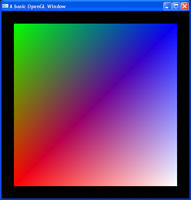 Along with assigning colours to objects, did you know you can also set colours to individual vertices? Well yes, yes you can.
Along with assigning colours to objects, did you know you can also set colours to individual vertices? Well yes, yes you can.programming
 Along with assigning colours to objects, did you know you can also set colours to individual vertices? Well yes, yes you can.
Along with assigning colours to objects, did you know you can also set colours to individual vertices? Well yes, yes you can.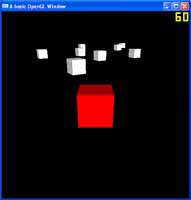 The first person camera is done, lets take a look at the third person camera, which is essential any type of Role Playing Game. The best part is, this tutorial uses most of the same code as the previous camera tutorial. Just some minor changes to entirely change the feel of your game.
The first person camera is done, lets take a look at the third person camera, which is essential any type of Role Playing Game. The best part is, this tutorial uses most of the same code as the previous camera tutorial. Just some minor changes to entirely change the feel of your game.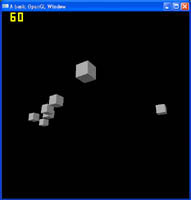 Here I will be extending upon the previous OpenGL Camera tutorial, and adding a strafe feature (moving side to side). A game without strafing, is going to be terrible, especially when it comes to multiplayer when strafing against enemy fire is essential.
Here I will be extending upon the previous OpenGL Camera tutorial, and adding a strafe feature (moving side to side). A game without strafing, is going to be terrible, especially when it comes to multiplayer when strafing against enemy fire is essential. If you look at making any game where the scene is larger than can be displayed in the window at once, then you are going to need some type of camera system. This is the first of several tutorials on building a first person camera system.
If you look at making any game where the scene is larger than can be displayed in the window at once, then you are going to need some type of camera system. This is the first of several tutorials on building a first person camera system. Display lists are a cached version of a set of OpenGL calls, which can be called again and again, at quicker framerates than writing the code over and over again. There is much controversy over the use of these against Vertex Buffer Objects in relation to speed, so I will show you both, starting with display lists in this tutorial.
Display lists are a cached version of a set of OpenGL calls, which can be called again and again, at quicker framerates than writing the code over and over again. There is much controversy over the use of these against Vertex Buffer Objects in relation to speed, so I will show you both, starting with display lists in this tutorial.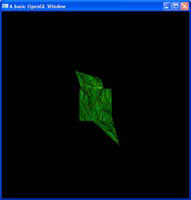 Mip maps are an essential texture extension, which creates scaled down versions of a texture and uses them when an object gets further away, or closer to the near plane. This scaled down version of the texture, makes for nicer, smoother looking textures.
Mip maps are an essential texture extension, which creates scaled down versions of a texture and uses them when an object gets further away, or closer to the near plane. This scaled down version of the texture, makes for nicer, smoother looking textures. Most games we know, run in fullscreen mode, and lucky for us, GLUT provides this ability also. So let me show you how to make use of it.
Most games we know, run in fullscreen mode, and lucky for us, GLUT provides this ability also. So let me show you how to make use of it.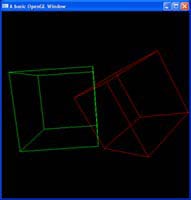 When drawing objects in OpenGL, it can be annoying that you do a translation, and then before drawing the next shape, you have to do a reverse translation to fix your positions. Well OpenGL being a state machine, has the ability to pop and push the current model view matrix, meaning you push on a duplicate of the current matrix before you do your translation, and then revert to the old matrix by pulling the new one off.
When drawing objects in OpenGL, it can be annoying that you do a translation, and then before drawing the next shape, you have to do a reverse translation to fix your positions. Well OpenGL being a state machine, has the ability to pop and push the current model view matrix, meaning you push on a duplicate of the current matrix before you do your translation, and then revert to the old matrix by pulling the new one off.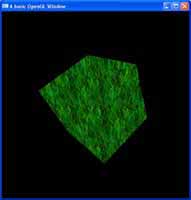 When assigning a texture to an object, you need to declare the texture coordinates, little values between 0 and 1 that tell us which part of the image maps to which part of the 3D model. OpenGL has some texture coordinate methods for generic texturing.
When assigning a texture to an object, you need to declare the texture coordinates, little values between 0 and 1 that tell us which part of the image maps to which part of the 3D model. OpenGL has some texture coordinate methods for generic texturing. The next step in the quest for realism after lighting, comes in the form of texturing. Texturing is the art of drawing an image on top of a 3D object and is the core behind all 3D applications. Could you imaging Half Life 2 coming out, and the characters looked like store mannequins?
The next step in the quest for realism after lighting, comes in the form of texturing. Texturing is the art of drawing an image on top of a 3D object and is the core behind all 3D applications. Could you imaging Half Life 2 coming out, and the characters looked like store mannequins?